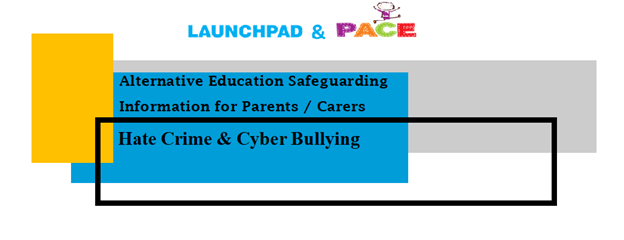Hate Crime

Hate crime and cyber bullying incidents are an increasing concern amongst young people today. It is important that young people and their parents have an awareness of what these are, what the consequences are and how to find help.
Hate Crime
There is no legal definition of a hate crime. However, the police and the CPS have an agreed definition of hate crime as:
"any criminal offence which is perceived by the victim or any other person, to be motivated by hostility or prejudice based on a person's race or perceived race; religion or perceived religion; sexual orientation or perceived sexual orientation; disability or perceived disability and any crime motivated by hostility or prejudice against a person who is transgender or perceived to be transgender"
There is a distinction between a hate crime and a hate incident.
"A hate incident is any incident which the victim, or anyone else, thinks is based on someone’s prejudice towards them because of their race, religion, sexual orientation, disability or because they are transgender"
However, a hate incident does not necessarily break the law. Where a hate incident amounts to a criminal offence, and is based on one of the five protected characteristics, it is known as a hate crime.
The type of conduct which will be considered as a hate incident is wide ranging and includes the following:
|
· Verbal abuse |
· Online abuse |
|
· Harassment |
· Displaying or circulating discriminatory literature or posters |
|
· Bullying or intimidation |
· Graffiti |
|
· Physical attacks |
· Arson |
|
· Threats of violence |
· Throwing rubbish in a garden; and malicious complaints |
|
· Hoax calls, abusive phone or text messages, hate mail |
|
Cyberbullying and the Law
Cyber-bullying / cyber-harassment can be understood as the use of information and communication technologies such as email, chat room, discussion group, blogs, websites, social networking sites, virtual learning environments, instant messaging, mobile phones or short message services for repeatedly deliberate and hostile behaviour by an individual or a group with the intention to harm others. It ranges from continuous e-mail-sending to someone who has said they do not want any further contact with the sender to threats, sexual remarks, pejorative labels, ganging up on victims by making them the subject of ridicule in forums, posting false statements, and passing on pictures, sound recordings or films via mobile phones.
Cyber harassment is also known as cyber-bullying or cyber-stalking. The motives range from emotional reasons to personal dislike and conflict of interests at work. Other motives can be prejudices on grounds of gender, racial or ethnic origin, religion and belief, disability, age, sexual orientation and body image.
Cyber-harassment is furthermore to be considered a psychosocial hazard, as it can deeply affect the personality, dignity and integrity of the victim.
There is no legal definition of cyberbullying within UK law. However there are a number of existing laws that can be applied to cases of cyberbullying and online harassment, namely:
|
· Protection from Harassment Act 1997 |
· Communications Act 2003 |
|
· Criminal Justice and Public Order Act 1994 |
· Breach of the Peace (Scotland) |
|
· Malicious Communications Act 1988 |
· Defamation Act 2013 |
Reporting an Incident
If you are concerned that your child is a victim or a perpetrator of a hate crime or cyberbullying incident you should report it immediately. The physical, social and emotional trauma of these incidents can have a detrimental impact upon a young person and can lead to serious consequences for the perpetrator.
Reporting a Hate Crime
To report an incident to the police by phone, call 101 or Text 18001 101. Call 999 if you’re reporting a crime that’s in progress or if someone is in immediate danger.
Go to the Stop Hate UK for more information on hate crime at www.stophateuk.org
Reporting Cyberbullying
Steps to Take Immediately:
- Don’t respond to and don’t forward cyberbullying messages.
- Keep evidence of cyberbullying. Record the dates, times, and descriptions of instances when cyberbullying has occurred. Save and print screenshots, emails, and text messages. Use this evidence to report cyberbullying to web and mobile phone service providers.
- Block the person who is cyberbullying.
There are a variety of ways to report Cyberbullying:
- Directly to the Online Service Provider.
- Report it to your child's School
- Contact the Police





